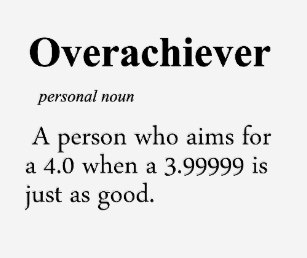Are you an overachiever or a high performer? Throughout my coaching experience I have coached many hardworking clients who have come to me because they are working long hours, are anxious and stressed about the future and unbalanced. In a recent article I was recently asked what the difference between an overachiever and a high performer was and to give tips on how to transition from the unhealthy role of an overachiever to the more healthy and rewarding role of a high performer.
Before I delve into some detail about the traits of an overachiever through a set of questions, it is important to sumarise the key aspects of the high performer. These people understand that the process is just as important as the result. They are the ones who nurture the people around them and build up businesses. The journey becomes the vital component in ensuring true long term success. So as you can see it is very healthy and fruitful to become a high performer, but why is it so unhealthy to be an overachiever?
Q) In your opinion what qualities or characteristics set overachievers apart from the rest?
- They are future focused, constantly worrying about what the future holds rather than enjoying the present and the journey itself.
- They are perfectionists, going above and beyond on each and every task they do.
- Work long hours, doing more of the work that people would stay away from.
- They hate failure or fear it and if they fail they view it as a slight on themselves.
- They secretly have a lot of self doubt, thinking they are not good enough.
- They seek love and approval through external ways. They will work harder than everyone else and do more on a task because they think it equates to love. By working hard people will love them more.
Q) Do you think that once a person starts doing well in a certain field there is a certain pressure to continue to excel? Both internally and externally?
- Yes if you start very well and set high (unrealistic) expectations to start with you will be putting pressure on yourself and facing pressure from others to maintain or even surpass that level. Raise the bar too soon and you are expected to keep growing and pushing on, sometimes to an unrealistic level. I believe slow and steady wins the race and it is better for long term emotional health. Pick and choosing what to excel or work even harder on is key. The bosses will give more work and praise lots. You may come addicted to the validation that you associate with praise, feeling love and respect comes from working harder and getting praised. You will then search for more to do and say yes to things you should not be doing and that others don’t want to do.
Q) Tell me about that internal pressure — how can it take a toll on a person?
- It can lead to that person becoming stressed and exhausted. All the long hours to get ahead of the game and doing work to ‘perfection’ – editing it, improving it and never quite thinking it will be good enough. It may lead to you not sleeping that much or have interrupted sleep as your brain is engaged and active.
- The never-ending competition with yourself and others will inevitably take its strain. Overachievers view failure more as a personal reflection on themselves and it will eat them up inside, whereas a high performer is more likely to embrace failure as part of the journey to ultimate goals. Rather than fear it and stay in the comfort zone they seek challenges and the growth that comes from that.
Q) Can it lead to an early burnout?
- Yes over achievers tend to be unbalanced. They tend to sacrifice their social life for a perfectionist life duly working on everything they are given regardless of the value it adds.
- They will feel resentment in long term and quickly burn out. If you imagine spinning lots of plates at once, eventually you will become tired and drop them.
Q) What can over achievers start to do to handle the internal pressure?
- They can set a realistic time limit on their decisions and tasks and stick to it as best as they can. Flawlessness and perfection is impossible, in fact it’s the enemy of good. Yes its ok to do over and above for some things but not everything. Pick over and above for the high value tasks.
- Start to do less important things imperfectly – set a certain time for those tasks and do the best job within that time slot. Then assign more time for the high priority, bigger, and most valuable tasks.
- Think about your work duties and strengths and take a moment to ask yourself the following things:
“Is this something I’m expected to do within my job role?”
“Is this something I enjoy and have a strength for doing?”
If yes…
“How will it benefit me or the company if I do it?”
“What is the value added of doing this job?” - Focus on work that adds value not putting excessive work into things anybody can do and becoming a busy bee. Anybody work does not get you the promotion.
- Know when to wait, when to attack, how to sacrifice, and when to change direction.
- Take a moment to meditate daily (headspace app) so you are in the present instead of angry/upset about past and being anxious or worried about the future.
Q) What can over achievers do to handle the external pressure? (from parents/ friends/ teachers or colleagues if they’re working)
- Communicate openly and honestly to manage expectations
- Learn to say no on occasions to work that does not add value.
- Take time out to strategies and target the value added / most important task first.
- Listen to your own self-talk and be more loving towards yourself. Your words and thoughts are more valuable than others.
- Take time out for self (life balance). Make your health (physical and emotionally) the most important priority.
- Start meditation. Try first with Headspace – a free app to get you into the present frame of mind for 10-15 minutes a day. Remember you don’t need to be great at it, do your best and know you will improve. Know that great things take time and commitment.
- Learn to take off the mask and put the ego aside. Practise being your transparent, authentic and honest self.
Q) What should all overachievers keep in mind in order to transition into high performers (achievers)?
- It is so important to remember that the joy is in the journey itself and not purely on the outcome. Success or failure is simply feedback and learning that will help your future growth.
- Life is about taking risks and sometimes failing. It is how you will ultimately grow. Good and great things come outside the comfort (dying) zone and on the other end of fear are the challenges you need to grow.
- Choose tasks that will quicken your growth, that are a struggle, yet add great value. You cannot win and be great at everything. Pick and select what you will do and what you will work over and above at.
- You feeling of love do not come from someone else praise on the tasks you do. It comes from inside of you. Work on loving yourself regardless. Get in the habit of talking positively about yourself and your worth.
- Differentiate between the image you project and the real person you are. As an overachiever, you are tempted by the trappings of success because they are proof that, “You won the game.” At least this one. You feeling of love do not come from someone else praise on the tasks you do. It comes from inside of you. Work on loving yourself regardless. Get in the habit of getting self recognition (talking positively about yourself and your worth) rather than external recognition
- Start to say no to unrealistic expectation from others and most importantly from yourself.
 +971 551387652
+971 551387652 info@uaecoaching.com
info@uaecoaching.com


